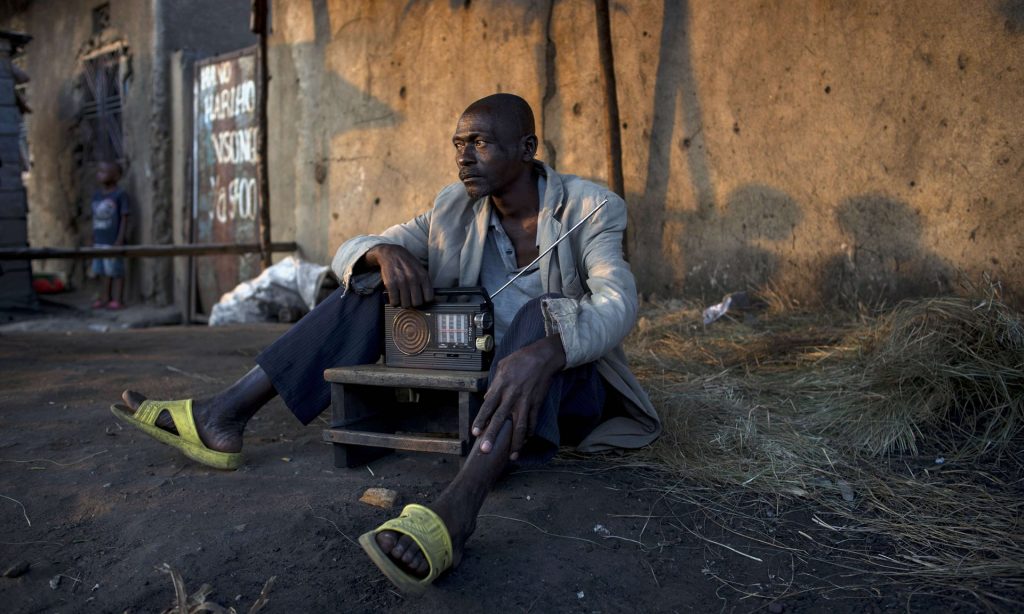Burundi’s year-long crisis has not gone away. It started with President Pierre Nkurunziza’s determination to claim a third term, trampling over the constitutional arrangements that ended a decade-long civil war.
Press freedom is a major casualty of the new strife; but the turmoil has also transformed the way in which Burundians get information. For better or worse, social media has filled the vacuum left by the shutting down of the most popular radio stations and forcing out of many of the country’s professional journalists.
With 90% of the population relying on radio as their main source of information, traditional media has been in the eye of Burundi’s gathering storm since at least 2010. During the abortive coup of 13-14 May last year, insurgents and opponents of the president’s bid for a third term tried and failed to take over the national radio television (RTNB), but they managed to destroy the government-linked Rema FM.
The next day, loyalist forces regained control of the city and destroyed radio stations including Bonesha, RPA, Isanganiro and Radio Renaissance. In August, a committee of inquiry established “complicity” between some private media bosses and the putschists, leading a prosecutor to issue arrest warrants against journalists.
Since then, the climate of violence, harassment and threats has driven about a hundred journalists into exile – that’s a third of all Burundi’s reporters. Foreign media are no longer welcome and dangers await those who do find their way in.
At home, the media landscape has been reduced to a minimum: religious and commercial radio are the last independent antennas standing. Reporters Without Borders ranks Burundi 156th out of 180 countries in its press freedom index.
Meanwhile, mobile phones have replaced radios as the main source of information. WhatsApp, Facebook, Twitter and texts have filled the gap. Mobile networks continue to function even during moments of severe crisis. The government can’t function without them, and amid severe budget constraints, it needs communication taxes.
Social networks have become an essential tool for daily life and self-protection for Burundians. People seek real-time information on any danger or risk in volatile neighbourhoods, from finding out about police raids to learning the target of the latest grenade explosions. They also search for news about those who have been arrested or abducted.
Social media also enables the population to attract the attention of the international community. During the government crackdown on public protests against Nkurunziza’s candidacy for a third term, Burundians circulated pictures on social media of police beating protesters and firing at unarmed civilians.
Mobile phones and social media maintain a link between many of Burundi’s constituent parts that appear steadily more remote and disconnected: the diaspora and the refugee camps; the capital city and rural areas; Burundi and the rest of the world.
But the rapid spread of news through social media brings its own problems. Such networks are efficient vehicles for propaganda and countering wild rumours such as “Burundi is about to launch attacks against Rwanda”, “Rwanda is about to launch attacks against Burundi”, “The Nkurunziza family has fled the country”, or “Last night, Tutsis were massacred in such-and-such a town.”
Social media users relay everything they hear, making it difficult to distinguish between valuable information, rumours and propaganda of the worst kind. Reports are not verified before being published, and are mostly emotional reactions to events published in real-time without the benefit of critical distance.
Although Burundi’s violent history makes these new forms of communication particularly sensitive, the rise of social media through mobile phones is far from unique. Across Africa, Twitter, Facebook and WhatsApp are used increasingly by political activists to bypass government censorship.
In some countries, this has led to a game of cat and mouse between authorities and the public. Shutting down mobile data around elections or periods of political tension is becoming common. In the Democratic Republic of the Congo, the government shut down mobile data during protests in January 2015 – but at significant cost to businesses that rely heavily on mobile payments. In Uganda, the government closed down mobile data for several days during the elections in February.
In Burundi, as more responsible radio stations are replaced by unfiltered voices spread by new technologies, journalists are trying to re-establish professional reporting in their country.
In March, a meeting was held in Brussels between Karenga Ramadhani, the new president of the Burundian National Council for Communication, and the banned media. This was a first step towards an improved political climate.
Since then, some arrest warrants against journalists have been lifted and both sides have made commitments to improve relations. Nevertheless, opening a space for public debate will only be possible if those promises are kept, and the situation returns to normal.
- Thierry Vircoulon is senior central Africa consultant at International Crisis Group

